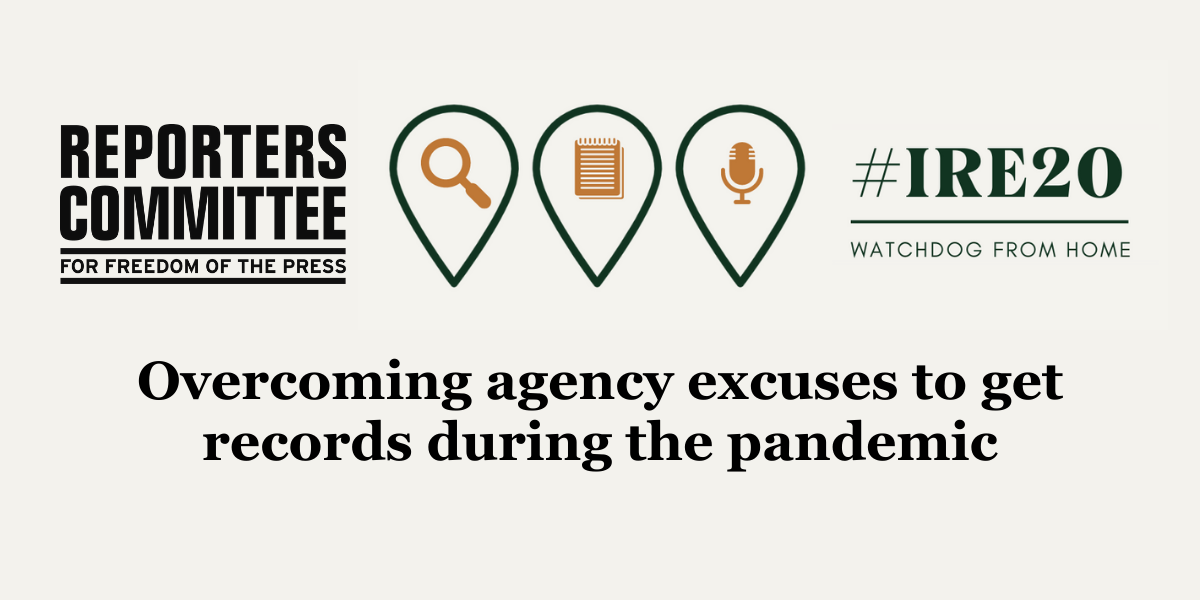At IRE conference, RCFP attorney offers tips for accessing public records during pandemic

Many government agencies are broadly citing the COVID-19 pandemic as a reason for putting public records requests on the backburner. Yet the need for government transparency and public access to records is more urgent than ever.
During a Sept. 21 panel at the 2020 Investigative Reporters and Editors conference, Reporters Committee Legal Fellow Gunita Singh joined Mark Walker, the New York Times’ Freedom of Information Act coordinator, and Salt Lake Tribune reporter Nate Carlisle to discuss tips to help journalists overcome agency excuses and obtain public records during the pandemic.
As a result of the pandemic, Singh reported, roughly 31 states have modified agencies’ obligations to comply with public records laws. She noted that the Reporters Committee has been tracking such changes since early March, as well as advocating for government agencies to proactively release public records online.
“No one knows better than journalists that public records have always been this key way to get primary source information on government conduct,” Singh said. “Without that, you eliminate this reliable way to hold government accountable. And, if you remove that mechanism in a time of crisis, it’s all the more concerning.”
Walker discussed his own struggle to access public records on behalf of the New York Times. He said the most effective strategy in getting records in a timely fashion is speaking with the designated public records official on the phone.
“Having that open dialogue with FOIA offices was something that was tremendously beneficial for me,” he said.
Walker said he approaches the records officials from a place of compassion and asks if there is anything he can do to narrow his request to make it more manageable.
In Utah, Carlisle said he turns to Utah’s public records ombudsperson when he has difficulty obtaining public records. The ombudsperson steps in to act as a referee when government agencies aren’t obeying the law.
The Salt Lake Tribune reporter said the ombudsperson helps keep the government accountable. He recommended that journalists thoroughly read through their state’s public records statute and look at the compliance and mediation services available in their state.
The panelists fielded many questions from attendees about the Health Insurance Portability and Accountability Act, which agencies often cite as a reason for withholding information about COVID-19.
The regulation, known as the “privacy rule,” is “meant to ensure that people’s health information is protected,” Singh said. “But the scope of that rule is frequently misunderstood.”
As the Reporters Committee explains in its guide to HIPAA during the COVID-19 health crisis, the privacy rule only applies to covered entities, primarily hospitals, clinical labs and health insurance plans. Not all public health departments or communicable disease divisions are covered by HIPAA.
“Perhaps most importantly, HIPAA’s privacy rule does not apply to de-identified or aggregate data, which is primarily what reporters are seeking to report about the virus’ toll,” said Singh.
Walker added that the Centers for Medicare and Medicaid Services has troves of information and data on hospitals and nursing homes across the country and has been responsive to his records requests thus far.
The panelists noted that, if all else fails, journalists should appeal or seek legal advice. In a tip sheet for the panel, Singh provided a link to the Reporters Committee Legal Hotline, which is available to journalists and media lawyers.
IRE conference attendees can access a recording of this panel, as well as a downloadable tip sheet, for a year after the conference.
The Reporters Committee regularly files friend-of-the-court briefs and its attorneys represent journalists and news organizations pro bono in court cases that involve First Amendment freedoms, the newsgathering rights of journalists and access to public information. Stay up-to-date on our work by signing up for our monthly newsletter and following us on Twitter or Instagram.